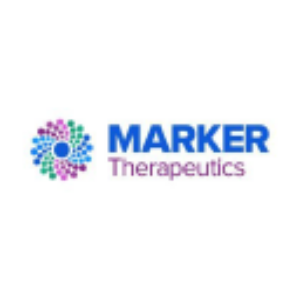Marker Therapeutics Reports that Lymphodepletion Improves the Expansion and Persistence of Multi-Antigen Recognizing T Cells in Patients with Lymphoma
Rhea-AI Summary
Positive
- 78% objective response rate in treated patients
- 44.4% complete response rate achieved as early as 4 weeks post-treatment
- Excellent safety profile with no dose limiting toxicities
- Record patient enrollment rate in early 2025
- Lymphodepletion shows improved T cell expansion and persistence
Negative
- Small patient sample size (only 9 patients) in current data
- Study still in early Phase 1 stage
News Market Reaction
On the day this news was published, MRKR gained 0.88%, reflecting a mild positive market reaction.
Data tracked by StockTitan Argus on the day of publication.
Preconditioning with lymphodepletion linked to stronger MAR-T cells response and suggests enhanced anti-tumor activity
Highest enrollment since study launch underscores momentum and signals a positive trial trajectory
Clinical data readout from Phase 1 APOLLO study expected later this year
HOUSTON, May 20, 2025 (GLOBE NEWSWIRE) -- Marker Therapeutics, Inc. (Nasdaq: MRKR), a clinical-stage immuno-oncology company focusing on developing next-generation T cell-based immunotherapies for the treatment of hematological malignancies and solid tumor indications, today reported scientific evidence from the Phase 1 APOLLO study demonstrating that lymphodepletion improves the expansion and persistence of MAR-T cells.
The Company’s Phase 1 APOLLO study is investigating MT-601, a MAR-T cell product, in patients with lymphoma who have relapsed after anti-CD19 chimeric antigen receptor (CAR)-T cell therapy or for whom anti-CD19 CAR-T cell therapy is not an option. In December, the Company provided an update on the progress and clinical observations from the study, with a data cutoff date of September 10, 2024 (Press Release, December 19, 2024). This update included clinical data from 9 patients from 5 clinical sites in the United States. Infusion of MT-601 was well tolerated in all study participants with no dose limiting toxicities (DLTs), including immune-effector cell associated neurotoxicity syndrome (ICANS). Objective responses were achieved in 7 out of 9 patients (
The Company previously reported that study participants showed early objective responses with and without lymphodepletion. Today, Marker provides data demonstrating preliminary evidence that lymphodepletion supports the expansion and persistence of MT-601 in vivo. Using T Cell Receptor (TCR) sequencing as an immunomonitoring strategy, the Company has evidence suggesting that MT-601 MAR-T cell clones in the drug product expanded and persisted at significantly higher levels in patients receiving lymphodepletion compared to patients who did not undergo the conditioning regimen. Preliminary results from this observation have been posted on the Investor Relations section of the Marker website.
The Company believes that the enhanced in vivo expansion and persistence of MT-601 may positively influence the clinical anti-tumor activity of MT-601 in the ongoing APOLLO study. Similar correlations have been observed when using lymphodepletion with other T cell therapies, including CAR-T and tumor infiltrating lymphocyte (TIL) products. While these prior studies have shown that T cell therapies can be effective with and without lymphodepletion, the use of lymphodepletion was associated with improved clinical outcomes and an enhanced expansion and persistence of T cells (Rosenberg SA, J Natl Cancer Inst, 1994; Ramos CA et al, J Clin Oncol, 2020; Turtle CJ et al, Sci Transl Med, 2016).
“We are excited to see these results from our immunomonitoring study,” said Juan Vera, M.D., President and CEO of Marker Therapeutics. “Our preliminary data clearly suggests that lymphodepletion increases the expansion and persistence of MT-601 in patients. This is the first time we have obtained this evidence in vivo and it provides a clear direction for our MAR-T cell studies going forward.”
Dr. Vera continued, “Comparative data from previous studies suggest that incorporating lymphodepletion in our MAR-T cell trials may enhance clinical outcomes by boosting T cell expansion and anti-tumor activity. Consistent with this, our immunomonitoring data indicates that lymphodepletion leads to a more robust antigen-specific T cell response. Importantly, despite the incorporation of lymphodepletion, MT-601 continues to demonstrate an excellent safety profile.”
Driven by encouraging early clinical data and a shifting competitive landscape, the Company today announced a marked increase in patient enrollment. In the first five months of 2025 alone, the Company enrolled and successfully manufactured product for more patients than in the entire year of 2024. This upward trend reflects growing momentum and is expected to meaningfully expand the magnitude of the clinical data set, which the Company plans to present later this year.
“We believe the incorporation of lymphodepletion was the right strategic decision as demonstrated by our immunomonitoring data. The incorporation of lymphodepletion has led to increased T cell expansion and persistence, which we believe has the potential to further enhance the clinical outcomes we are seeing. We are now enrolling at an increased pace and are well-positioned to generate meaningful data, which we expect to share by the end of this summer,” concluded Dr. Vera.
About MT-601
The Company’s lead product, MT-601, is a multi-antigen recognizing (MAR) T cell product that utilizes a non-genetically modified approach that specifically targets six different tumor antigens upregulated in lymphoma cells (Survivin, PRAME, WT-1, NY-ESO-1, SSX-2, MAGEA-4). Marker is currently investigating MT-601 in the Company-sponsored Phase 1 APOLLO trial (clinicaltrials.gov identifier: NCT05798897) for the treatment of patients with lymphoma who have relapsed after or are not candidates for anti-CD19 CAR-T cell therapies.
About APOLLO
The APOLLO trial (clinicaltrials.gov Identifier: NCT05798897) is a Phase 1, multicenter, open-label study designed to evaluate the safety and efficacy of MT-601 in participants with relapsed or refractory lymphoma who have either failed anti-CD19 chimeric antigen receptor (CAR) T cell therapy or are not candidates for anti-CD19 CAR-T cell therapy. The primary objective of this exploratory Phase 1 clinical trial is to evaluate the optimum dose, safety, and preliminary efficacy of MT-601 in participants with various lymphoma subtypes. Under the APOLLO trial, it is anticipated that nine clinical sites across the United States will cumulatively enroll up to approximately 30 participants during the dose escalation phase.
About MAR-T cells
The multi-antigen recognizing (MAR) T cell platform (formerly known as multiTAA-specific T cells) is a novel, non-genetically modified cell therapy approach that selectively expands tumor-specific T cells from a patient’s/donor’s blood capable of recognizing a broad range of tumor antigens. Unlike other T cell therapies, MAR-T cells allow the recognition of hundreds of different epitopes within up to six tumor-specific antigens, thereby reducing the possibility of tumor escape. Since MAR-T cells are not genetically engineered, Marker believes that its product candidates will be easier and less expensive to manufacture, with an improved safety profile compared to current engineered T cell approaches and may provide patients with meaningful clinical benefits.
About Marker Therapeutics, Inc.
Marker Therapeutics, Inc. is a Houston, TX-based clinical-stage immuno-oncology company specializing in the development of next-generation T cell-based immunotherapies for the treatment of hematological malignancies and solid tumors. The Company was founded at Baylor College of Medicine, and clinical trials that enrolled more than 200 patients across various hematological and solid tumor indications showed that the Company’s autologous and allogeneic MAR-T cell products were well tolerated and demonstrated durable clinical responses. Marker’s goal is to introduce novel T cell therapies to the market and improve patient outcomes. The Company prioritizes the preservation of financial resources and focuses on operational excellence. Marker’s unique T cell platform is strengthened by non-dilutive funding from U.S. state and federal agencies supporting cancer research.
To receive future press releases via email, please visit: https://www.markertherapeutics.com/email-alerts.
Forward-Looking Statements
This release contains forward-looking statements for purposes of the safe harbor provisions of the Private Securities Litigation Reform Act of 1995. Statements in this news release concerning the Company’s expectations, plans, business outlook or future performance, and any other statements concerning assumptions made or expectations as to any future events, conditions, performance or other matters, are “forward-looking statements.” Forward-looking statements include statements regarding our intentions, beliefs, projections, outlook, analyses or current expectations concerning, among other things: our research, development and regulatory activities and expectations relating to our non-engineered multi- antigen recognizing T cell therapies; the effectiveness of these programs or the possible range of application and potential curative effects and safety in the treatment of diseases; the timing, conduct, interim results announcements and outcomes of our clinical trials of our product candidates, including MT-601 for the treatment of patients with lymphoma. Forward-looking statements are by their nature subject to risks, uncertainties and other factors which could cause actual results to differ materially from those stated in such statements. Such risks, uncertainties and factors include, but are not limited to the risks set forth in the Company’s most recent Form 10-K, 10-Q and other SEC filings which are available through EDGAR at WWW.SEC.GOV. The Company assumes no obligation to update its forward-looking statements whether as a result of new information, future events or otherwise, after the date of this press release except as may be required by law.
Media and Investor Contact
Marker Therapeutics, Inc.
+1 (713) 400-6400
investor.relations@markertherapeutics.com








